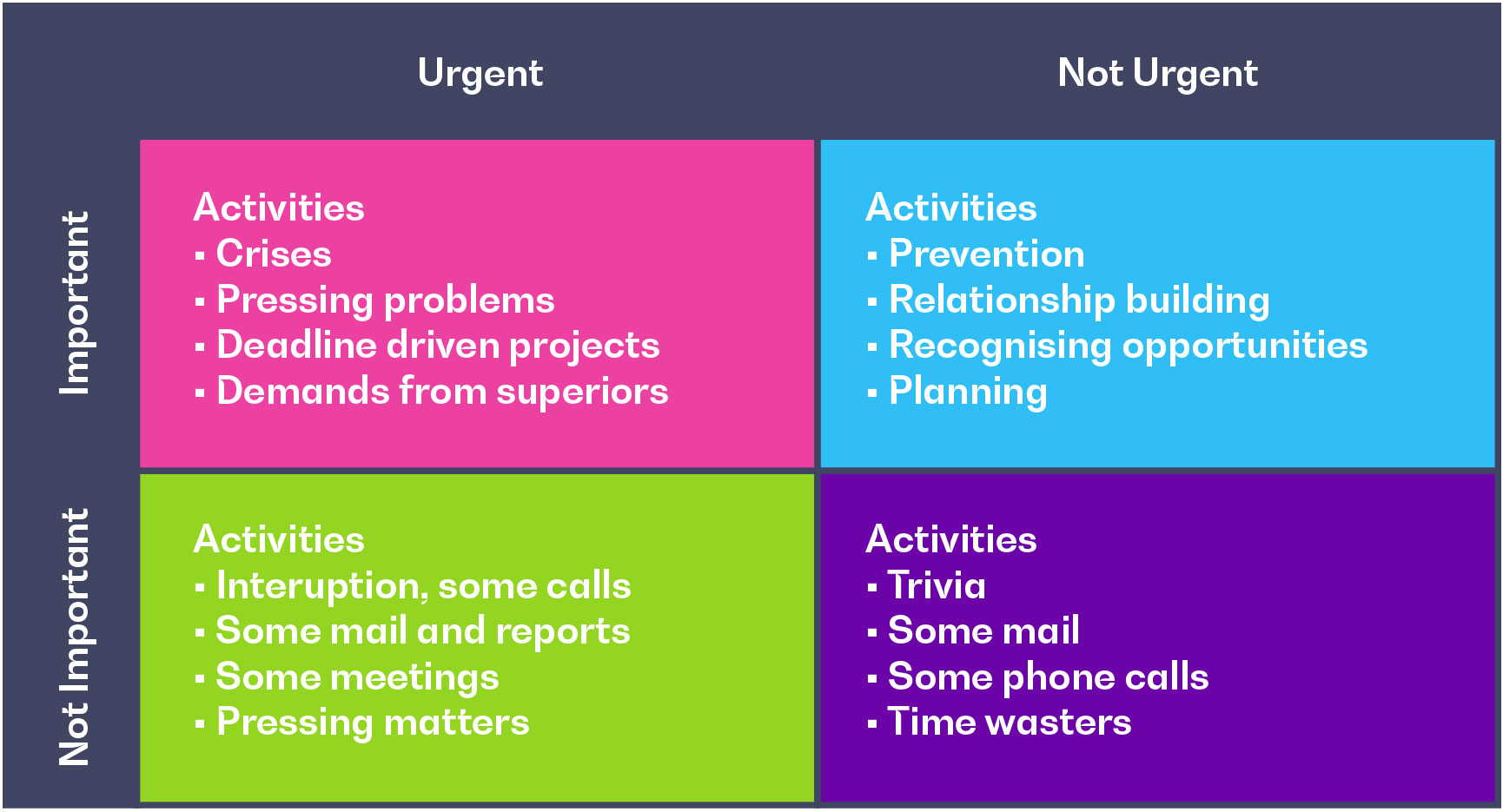What is Time Management?
Time management is considered to be one of the primary “soft skills” valued in the workplace, and effective time management skills are key to a successful work life.
We all have the same amount of time available to us each day. And that time is valuable. Once it has passed, it is gone forever.
The strategic plan may be well thought through. However the best of plans can fall apart without the ability to recognise the impact that personal time management has on our capability to respond to and understand how we deal with urgent, important and non urgent/important tasks.
Once you have experienced the ‘pleasure’ of meeting deadlines, being punctual, arriving organised you may not want to feel the ‘pain’ of poor SELF management again. However as they say ‘old habits die hard’ – it will take commitment and effort to become an organised person – but the benefits are many.
Benefits of Efficient Time Management
Less Stress
Managing your time can directly reduce your stress level. Fewer surprises. Fewer tight deadlines. Less rushing from task-to-task and place-to-place.
Get More Done
Of course, being productive is one of the main goals of time management. When you are aware of what you need to do, you are able to better manage your workload. You will be able to get more (of the right tasks) done in less time.
Less Rework
Being organised results in less rework and mistakes. Forgotten items, details, and instructions lead to extra work. How often do you have to do a task more than once? Or make an extra trip because you forget something?
Less Personal Friction and Problems
How often do you create your own problems? Whether it is a forgotten appointment or missed deadline, not managing your time results in increased personal friction. Avoid creating your own problems by planning and preparing for your day.
More Free Time
We can’t create more time, but you can make better use of it by managing your time. Even simple actions like shifting your commute or getting your work done early can produce more leisure time in your life.
Less Wasted Time
When you know what you need to do, you waste less time in idle activities. Instead of wondering what you should be doing next, you can already be a step ahead of your work.
Less Effort
A common misconception is that time management takes extra effort. To the contrary, proper time management makes your life easier. Things take less effort, whether it is packing for that trip or finishing up that project.
More Time where it Matters
Managing your time is allotting your time where it has the most impact. Time management allows you to spend your time on the things that matter most to you as a manager Such as time spent with your team such as coaching and development.
Always remember – Fail to prepare, prepare to fail.
Planning takes time, thought and effort.
Do now
Plan to do
Reject & explain
Resist & cease
Time Management Best Practice
Time Management starts with the commitment to change
Preview your schedule – understand your progress:
- Review your activities
- Look at the day in the context of the week to prevent overloading
- Build in contingency to allow for a positive response to change or emergencies
Prioritise: identify activities as QI or QII-keeps QIII and QIV out of your schedule
- Places importance on the key activities
- Keeps you aware of choices you make
- Understand that prioritisation includes only items that you’ve put in the time management framework
Time sensitive activities on the right, any time activities on the left:
- Makes for effective schedule decisions
- Helps you remain sensitive to commitments
Best use of your time: remember importance rather than urgency!
7 Habits of Highly Effective People
The 7 Habits of Highly Effective People, first published in 1988, is a business and self-help book written by Stephen R. Covey. Covey presents an approach to being effective in attaining goals by aligning oneself to what he calls “true north” principles of a character ethic that he presents as universal and timeless.
Be proactive
This is the ability to control your environment, rather than have it control you as can so often be the case. Self-determination, choice and the power to decide your response to stimulus, conditions and circumstance.
Begin with the end in mind
This is the habit of personal leadership, leading yourself towards your aims. By developing the habit of concentrating on relevant activities, you will build a platform to avoid distractions and become more productive and successful.
Put first things first
This is the habit of personal management. This is about organising and implementing activities in line with the aims established in habit 2. Covey says that habit 2 is the first or mental creation and habit 3 is the second or physical creation.
Think win-win
This is the habit of interpersonal leadership, necessary because achievements are largely dependent on co-operative efforts with others. He says that win-win is based on the assumption that there is plenty for everyone. He adds that success follows a co-operative approach more naturally than the confrontation to win or lose.
Seek first to understand and then to be understood
This is Covey’s habit of communication. Put simply, diagnose before you prescribe; simple and effective.
Synergize
This is the habit of creative co-operation, the principle that the whole is greater than the sum of the parts, which implicitly lays down the challenge to see the good and potential in the other person’s contribution.
Sharpen the saw
This is the habit of self-renewal and it surrounds all the other habits, enabling and encouraging them to happen and grow. Covey interprets the self into four parts – the spiritual, mental, physical and social/emotional which all need feeding and developing.
Short Interval Control
Generally, we spend our day reacting to events and situations. Often we get to the end of the day and it can feel like we have achieved very little as the day has passed in a ‘reactive’ ‘fire-fighting’ blur. Or suddenly KPI’s that seemed in the morning to be on track, went off the rails by the end of the day.
Working remotely from your team heightens this issue tremendously. Most Managers use their experience and instinct, often gauging the productivity of a team through visual observations and opportunities to regularly ‘check-in’ with the team as part of their Manager framework activities planned during the day.
The value of proactive management is clearly laid out in ‘Proactive vs Reactive’ management. Short Interval Control is a critical tool which can be used to pro-actively support task management with a team, and also in dealing with keeping KPIs and key measurable activities on track.
What is Short Interval Control?
Short Interval Control (SIC) is a quick ‘pit-stop’. An opportunity to check performance and progress towards tasks and goals in order to make ‘in the moment’ decisions to ensure everything stays on track.
When we don’t check team and performance regularly we end up constantly dealing with urgencies and as we know, being in Q1 on the Time Matrix is exhausting and very stressful.
Additionally, we can get caught up in the busyness of the day and make snap decisions without really thinking things through and considering everything as a whole.
The ‘all hands to the pumps’ solves things ‘in the moment’ but completely impacts everything else, for example:
- A coaching session planned to impact performance doesn’t take place and so planned increases in a KPI don’t occur till another week.
- A team meeting is cancelled and so the focus for the next week and key messages and decisions are delayed which again impact performance.
- A TL’s planning session for a team meeting has to go by the wayside and now the meeting lacks an agenda, focus and structure and is ineffective.
We often refer to the Manager Framework as being a little like a SatNav and SIC is an important activity which should be planned into your framework on a daily basis.
How do you SIC?
- SIC is all about having the discipline to plan small moments of calm and reflection to check your course is on track and re-plan if not.
- During a SIC ‘pit stop’ you are checking that the route planned at the start of the day is still the right route and making sure that roadblocks, congestion or other people haven’t de-railed your plans, sending your SatNav off track.
- SIC is an opportunity to re-route, giving you the best chance of achieving your daily team and performance goals.
- Review where you’re current position
- Forecast where you’ll be if you don’t take action
- Re-forecast ‘ in the moment’ considering what you now need to do
- Plan the change and associated actions
- Take action by making the change yourself, if it affects you personally, or communicating to the team if it affects them and the activities they are engaged in – 5-minute team huddles at midpoints in the day can be key to support this.
Getting started with SIC
Thinking of your role and your business area, identify 5 things that currently de-rail you and consider opportunities that could be taken to routinely check performance and get things back on track if needs be.
Here are a few SIC opportunities you might want to consider:
- Effective email management
- Upward management (pushing back to up-line manager to ensure achievement of planned activities)
- ‘in the moment’ coaching to support team members if required
- Contingency planning
- Effective buzz briefs/intra-day and week management
- Daily planning to re-align activities
- Regular checking of measured activities (and not just when things have increased and are out of control needing recovery!)
Don’t forget that a number of other Active Manager tools are useful companions to the SIC process including:
- Time Matrix
- Manager Framework
- RACI
Watch Video for more on Short Interval Control:



